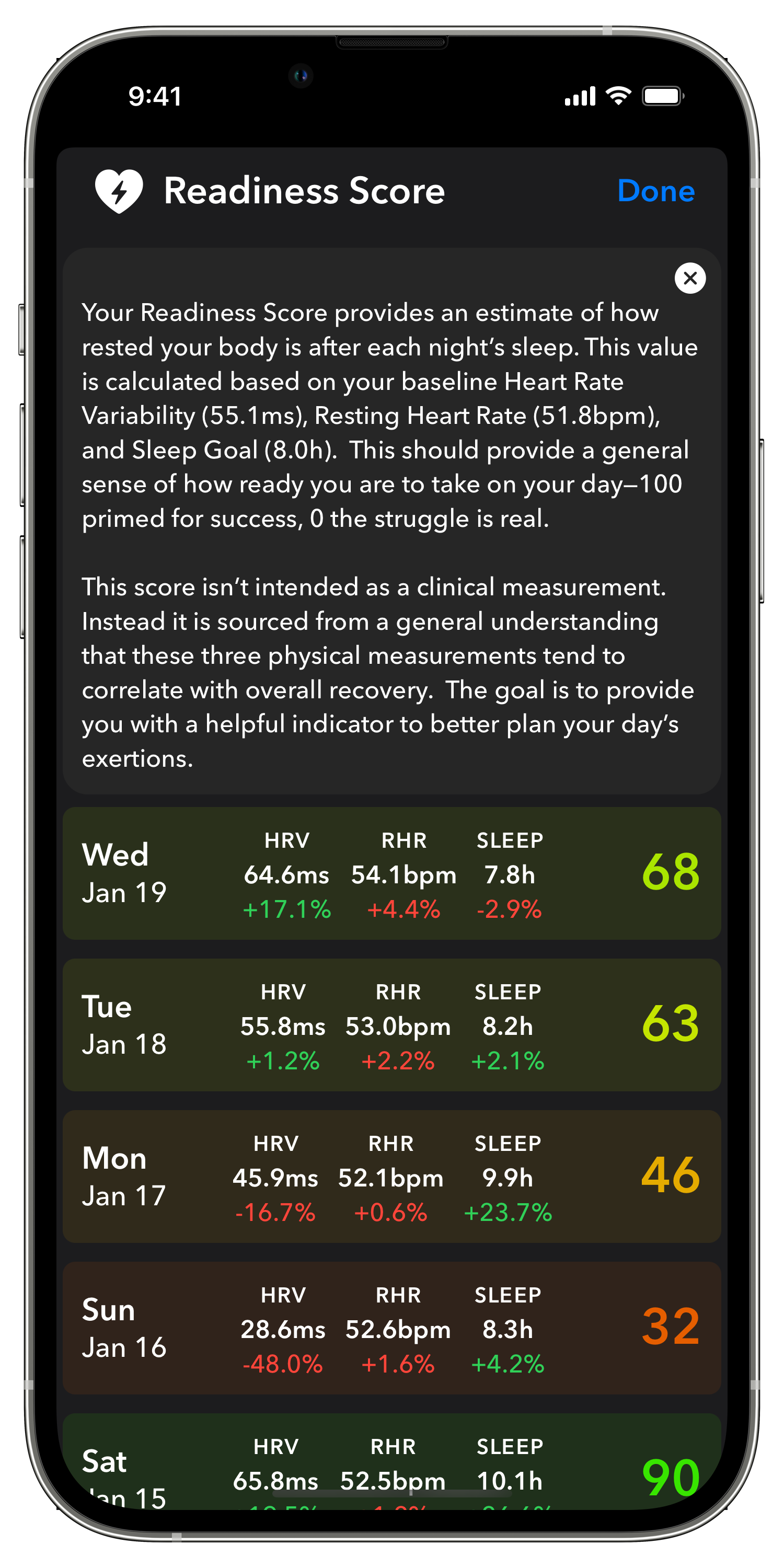
Today I’m delighted to announce the release of Sleep++ version 4.5. This update adds a long requested feature, Readiness Score.
What is Readiness Score?
There are a number of dedicated fitness trackers that seek to provide you with an indication of how “rested” or “recovered” you are each night’s sleep. My goal is to bring this to automatic sleep tracking on the Apple Watch.
This score is based on three measurements that have been found to generally correlate with how restorative your sleep was:
-
Heart Rate Variability (HRV): This is a measurement of how consistently your heart is beating during periods of restful sleep. The less consistent each beat of your heart is, the better the indication that your body is restored. Highly consistent heart beats are often an indication that your body is still in a higher stress mode and thus unable to engage in repair and restoration. HRV is a highly personalized measure, so I establish your personal baseline for comparison.
-
Resting Heart Rate (RHR): This is a measurement of how often your heart is beating while you are in periods of restful sleep. The lower this value is the better it is an indication that you are in restorative sleep. Since your RHR will fluctuate with your fitness, as well as your nightly recovery, I compare your RHR to your 30 day moving average to allow it to adjust to your current fitness.
-
Restful Sleep Duration: This is simply the total amount that you sleep each night where you appear to be calm and restful. If you aren’t sleeping enough in a night you are unlikely to have given your body sufficient time to repair and restore itself. For Sleep++’s readiness score I compare your sleep duration against your nightly sleep goal to establish your baseline.
These three values are then combined into a single numerical score from 0 to 100. With 100 indicating that all three measures are pointing you towards a highly restorative night. And 0 indicating that your body appears to have been really struggling during the night. Additionally, each composite value, and its comparison to baseline, is shown for reference.
It is important to treat this value as an indicator and not a clinical measurement. While there is substantial research to indicate that these three factors generally correlate with your sleep performance, they can be impacted by a wide variety of factors that can reduce their precision. The idea here is to give you a general sense of how prepared your body is and for you to then use that to make healthy choices for your day.
Using your Readiness Score
I have found that generating this score is helpful to me in two main ways: identifying poor habits and regulating my daily exertion.
Identifying Poor Habits
In working with the beta testing group for this feature I heard from several users that this score helped them quantify the impact of certain habits on their night’s restoration. For example, I heard from several folks that they could clearly see a connection between drinking alcohol and a lowered readiness score the following day. Similarly, drinking caffeine or eating large meals right before bed can negatively impact your body’s ability to sleep effectively.
What you do with that impact is up to you, but it is often helpful and motivating to be able to see a numerical impact from a behavioral choice. The negative case is often the most pronounced, but I have also seen benefit from identifying positive habits as well. Where if I really try to setup a good nights sleep (consistent bedtime, reduce screens before sleep, dark room, etc) I can affect a positive change as well. Which is super encouraging.
Regulating your Daily Exertion
Your ability to engage in high intensity activity is meaningfully impacted by your previous night’s sleep. This can be with regards to exercise, adventure or just normal life. The more rested you are, the more strain and challenge you are capable of effectively undertaking.
What I have found is that my Readiness Score gives me a good indication on which days I should “crush it” at the gym and which days I should “back off.” If I try to really workout with intensity on a day with a super low score I am often frustrated with my ability to perform and have sometimes even found that I am more prone to injury. Conversely, when I have a day with a high Readiness Score it is an opportunity for me to try and really make the most of it and get some work done.
This regulation of your activity level has really helped me to keep a more consistent exercise regime where I don’t get frustrated by the off days as much, and really can make fitness gains on the good days.
Conclusion
Your readiness score is available immediately after each night’s data is analyzed. Simply tap in the top right corner, on the heart shaped icon.
I have found Readiness Score to be super helpful during its development, and I hope it will help you too. It has altered how I think about my sleep and fitness regime, and encouraged me to make meaningful changes to improve my health.